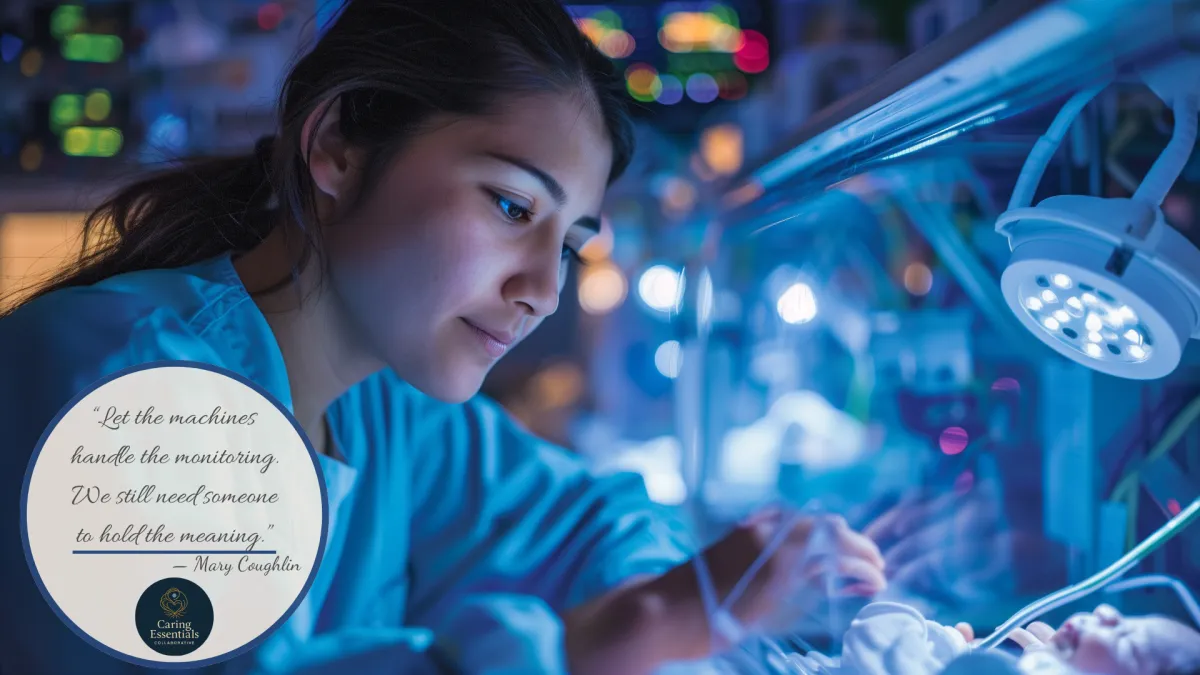
Will Nurses Be Replaced by AI? No. But They May Finally Be Seen.
“Let the machines handle the monitoring. We still need someone to hold the meaning.” - Mary Coughlin
Will Nurses Be Replaced by AI? No. But They May Finally Be Seen.
Artificial intelligence is changing healthcare—and fast.
But while much of the conversation has focused on doctors, diagnostics, and data, there’s a quieter, more profound reckoning happening beneath the surface:
What does AI mean for nursing—the heart of care?
Will nurses be replaced?
No.
But they may finally be recognized for what they’ve always been: the relational infrastructure of healing.
Nursing Has Never Been Just a Task
Despite how the system has often treated them, nurses are not merely assistants to physicians or executors of orders.
Nurses are:
The first to notice subtle changes that save lives
The last to leave the room when everyone else walks out
The ones who hold the crying parent, the dying patient, and the overwhelmed new nurse
And they do all of this while documenting every detail, advocating in care plans, catching medication errors, and anticipating needs before they’re spoken.
Their work is clinical and spiritual, scientific and sacred.
What AI Can Do
Let’s be clear: AI can bring tremendous relief to nurses. It can:
Automate documentation
Monitor vitals
Generate shift handoff reports
Triage messages
Even assist in education
This is good. Nurses are drowning in tasks that keep them away from the bedside. Let AI carry some of that weight.
What AI Can’t Do
But here’s what it can’t do—and will never do:
Offer grounded presence in moments of chaos
Sense a parent’s unspoken fear and shift tone accordingly
Regulate a fragile nervous system through rhythm, tone, and eye contact
Understand cultural nuance or lived trauma
Bear witness to suffering—not just fix it, but hold it
This is the realm of human care. And no machine belongs there.
A Trauma-Informed Perspective
From a trauma-informed lens, the nurse is not just a “care provider.”
The nurse is a buffer, a bridge, a mirror of safety in an unsafe world.
Nurses don’t just tend to wounds—they tend to meaning.
They don’t just administer medication—they administer reassurance.
They notice what’s not being said.
In other words: nurses are presence in its most healing form.
The Future of Nursing
If we let AI absorb the mechanical and repetitive tasks, we can finally free nurses to do what they are uniquely gifted for:
Deep relational care
Cultural advocacy
Story-holding
Trauma-sensitive communication
Interdisciplinary leadership
Moral witnessing
In this future, nurses are not just needed.
They are central.
A Reckoning—and an Invitation
Let’s not talk about replacing nurses.
Let’s talk about repairing the way we’ve undervalued them.
Let’s talk about reimagining systems that honor relational labor—not just technical skill.
Let’s talk about what it means to finally see the heart of care for what it truly is:
Not a task to be delegated,
but a presence to be revered.
Reflection Prompt
Who was the nurse who changed your life?
What did they know—without needing to be told?
You’re Invited
If you’re a nurse reading this:
You are not replaceable. You are revolutionary.
Join us inside the TIP 2.0 Certificate Program—a space where we explore the science, soul, and skills of trauma-informed care. Where your presence is seen as essential, not optional. And where the future of care is being reimagined—one healing moment at a time.
Because AI may change the tasks.
But you will always be the care.
Take care and care well,
Mary
